| Construction Rating: | starstarstarstarstar_border |
| Flight Rating: | starstarstarstarstar_border |
| Overall Rating: | starstarstarstarstar_border |
| Length: | 13.38 inches |
| Manufacturer: | Starlight Rockets |
| Style: | Scale |
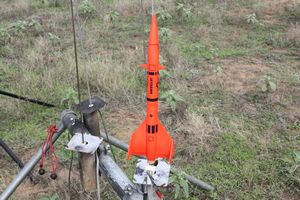
Brief:
As a kid I liked the looks of the Jay Hawk but never had one. When Starlight introduced their kit, I ordered it and
it has been sitting around since. I was up to my eyeballs in other projects but again found myself in a situation where
valuable rocket time was going to waste because I was waiting for glue or paint to dry, waiting for parts, or just
plain tired of sanding. I saw the Jay Hawk bag beckoning too me and all of the sudden I had another project to juggle.
The Jay Hawk is a semi-scale of the old target drone. It looked simple but nice, designed to fly on 18mm motors and recover with a chute. It is marketed as a skill level 2 kit and that seems about right with today's inflated scales.
Construction:
Construction begins by marking off the motor tube for the engine hook, making a mark, and then a slit to insert the
hook. When the hook was in place, the thrust ring was glued right above it and the edges were filleted.
The kit came with two centering rings. Both were extremely tight and had to be sanded and even trimmed a bit with a razor to slip over the motor tube. Once they did fit, they were glued in place and filleted with yellow glue.
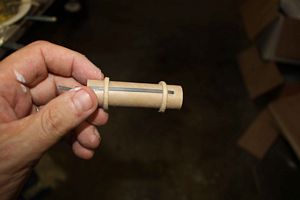
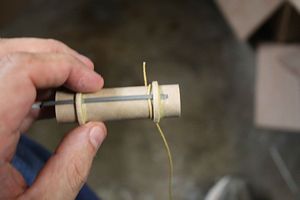
The fins were of good quality balsa and were removed from the parent material. Although the instructions made no mention of this, I rounded the leading and trailing edges. The little finlets mounted forward were also rounded on the leading, trailing, and outer edges.
The nose cone was made of plastic and came in 2 pieces. Unlike the Estes cones, this one had no visible seam. The base was glued into place with a bit of epoxy I had mixed for another project.
The outer parts of the fins (rudders?) were lightly sanded and then glued along their centerlines to the outer edges of the fins with a double glue joint of yellow glue. A steel ruler was used to ensure that the angle between the two pieces was a right angle.
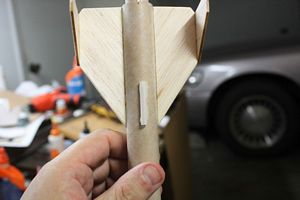
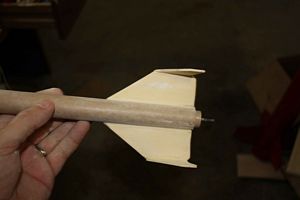
At this point I added a step since the kit included a stick on shock cord mount reminiscent of what Centuri used to provide. Instead of doing this, I wanted to attach Kevlar® to the motor mount. I tied a length of Kevlar® around the motor mount just abaft of the forward centering ring and then laid another yellow glue fillet over it to hold it in place. When it dried, the ring was notched to pass the Kevlar®.
When the glue on the shock cord was dry, I passed the cord through the motor tube and then swabbed the inside of the BT with yellow glue. I pushed the motor mount in and had just gotten everything aligned when I realized that I had shoved it into the wrong end. Oops! I was able to pull it back out, clean out the glue, and then reinstalled it correctly.
It might be legitimately asked why it mattered which end of the BT the motor mount was installed in since nothing had been done with the BT yet. The reason is that Starlight ships its body tubes with the fin and lug lines already marked. That being the case, it is nice to have the main fins at the same end of the rocket as the motor.
The first fin was mounted with yellow glue and a double glue joint along one of the pre-marked lines. When it was in place, it was carefully checked for alignment and to make sure it extended at the proper angle. After the first fin had dried, the second was placed in the same manner.
The forward finlets were likewise applied in the same manner along the provided lines. The launch lug was also glued into place along its line. While the glue was drying, I also went ahead and tied the provided elastic to the Kevlar® anchor.
When the glue had a full day to dry, I used Tightbond Molding and Trim glue to apply fillets along all the fin joints and the launch lug. I cannot stress enough how pleased I am with this product in this role. (Thanks to Luke Strawalker of TRF for telling me about it.)
As the fillets were drying, I went ahead and tied the nose cone onto elastic. With that, the construction was done and it was time to move to the finishing.
Finishing:
The first step in the finishing process was to fill the grain and I did so using Elmer's Wood Filler. It was brushed
on and then left for a few days to dry. The sanding process was then begun and I was reminded of the wisdom of often
doing this before the fins are installed. My big hands and fat fingers had a hard time getting into the crevasses but
eventually it was done.
After the sanding, the rocket got a trip to the spray booth and was primed with Kilz. That too got a day to dry and it needed some more sanding. Instead of spraying on more primer though, I gave it a coat of regular white paint. After another day for the white to dry, The rocket was painted with several thin coats of fluorescent red until the color built up deeply.
The application of the decals started off easy with the putting on of the USAF roundels on either of the vertical stabilizers. Then came a hatch just abaft of the nose cone. Another hatch was placed on the dorsal surface between the fins. Abaft of the forward hatch was placed a thick dashed line. And behind that went the name, "Jayhawk". Even with the name but on the sides instead of the top or bottom were placed the larger US roundels. A thicker dashed line was provided to be placed around the BT aft, well within the fin area. I cut the stripe in half and placed one half on the dorsal surface. The other half was again cut in half to fit around the launch lug and both halves were placed on the ventral surface. Probably the most difficult decal to apply was a red stripe that ran around the nose and twice contained the text, "target". It was not really hard but needed some working to get properly into place. I managed to finally get the ends of the stripe to meet up and then realized I had placed it with the text upside down in relation to the rest of the rocket. After that was the first of the "mystery" pieces. It was a little blue circle with a cross in the middle. I have no idea what it represents but the placement was clearly shown on the face card on the dorsal surface near the hypothetical apex of the angle formed by the fins. I placed the solid blue stripe just to the rear of the roundels and name. I was to learn later that this was too far forward. A set of 4 decals represented the ailerons. These were placed top and bottom on both of the fins.
At this point I was left with 3 decals. 2 were yellow stripes that were obviously intended to wrap around the BT. The third was a long skinny hatch like thing. All the decals thus far had been placed by looking at the facecard. The problem was I couldn't see the yellow stripes on the facecard or the little hatch-like thing. I fired off a question to Starlight Rockets on TRF and quickly got a reply. The yellows were to go just for and aft of the solid blue. The hatch thing was moot since it managed to blow away and was never seen again. The yellows were applied, closer together than they should have been because of my placement of the blue, and the decal application was complete.
The decals were all good quality waterslides. If I were to change anything, I think I would add some white backing to the decals to make them stand out a bit more against the painted body but that may be incorrect for this model. I simply don't know. Mr. Jablonski of Starlight has informed me that the instructions of this and several other kits of their line are due to be upgraded with more explicitness in the placement of the decals. That might be nice, but for the most part, the locations were evident from the face card and anyone wanting to be a stickler for accuracy can always use Google.
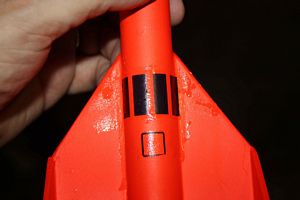
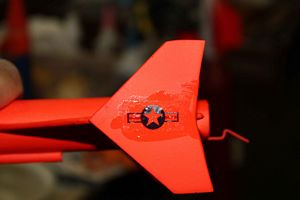
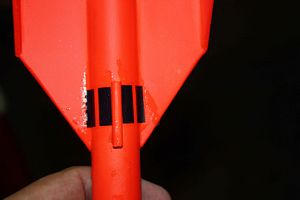
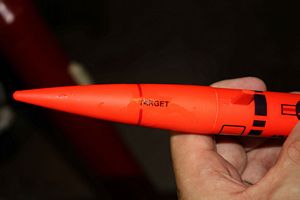
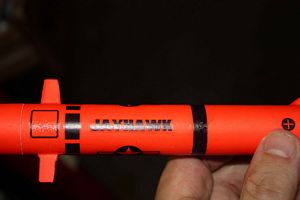
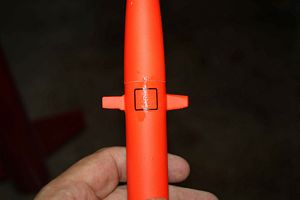
Construction Rating: 4 out of 5
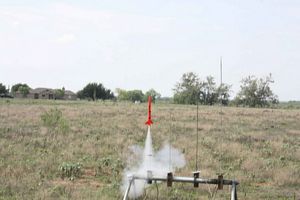
Flight and Recovery:
The maiden flight of the Jay Hawk was on an A8-3. I installed a 9" nylon chute, inserted the motor and took it
out to the pad. It was favorably received by the few who had arrived by that point. The boost went well and, being a
light rocket, went pretty far for an A. Ejection occurred at apogee, possibly just before and the chute deployed. It
drifted down gently and was ready to be flown again. A
video of the first flight can be seen here.
For the second flight I chose a B6-4 and prepped the rocket as before. By this time, however, a few more people had arrived and the Jay Hawk received some more favorable comments out at the pad. The flight was again impressive in terms of straightness and altitude. The chute deployed and the rocket drifted down in what looked like a perfect landing. When I got the rocket back, though, it had apparently had a hard landing. Part of one fin had snapped off. It will be repaired. A video of the second flight can be seen here.
Flight Rating: 4 out of 5
Summary:
This was a nice little rocket that looks good and flies well. I cannot blame the broken fin on the kit; sometimes you
get lucky and sometimes you don't. Besides, the chute I used was smaller than the recommended one.
Persons wishing to keep track of this rocket are invited to check it out here.
Overall Rating: 4 out of 5
 |
 |
Flights
Sponsored Ads
 |
 |











